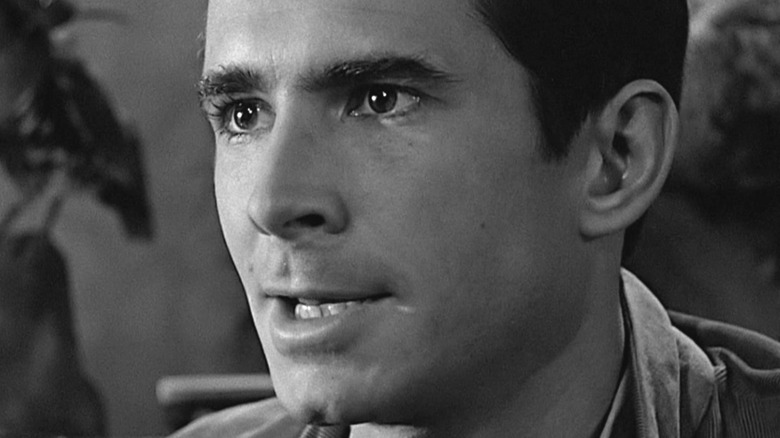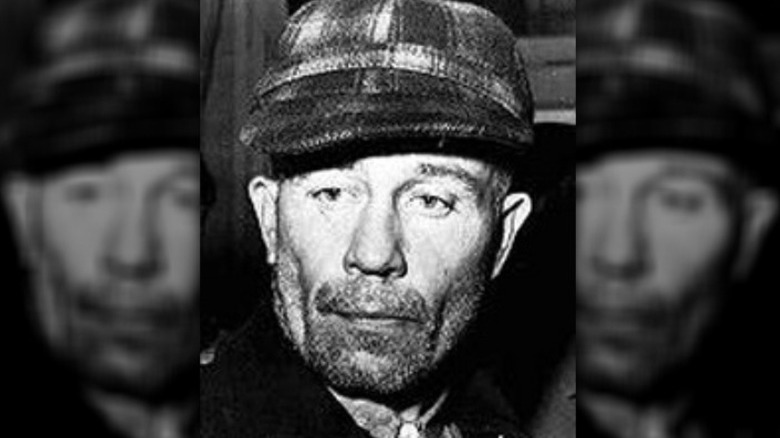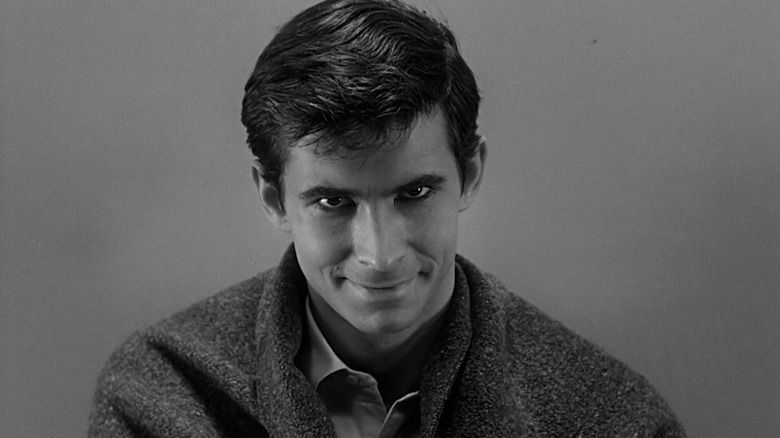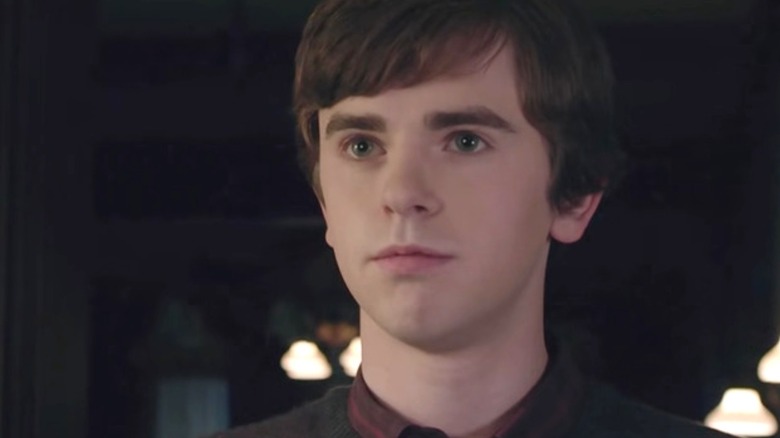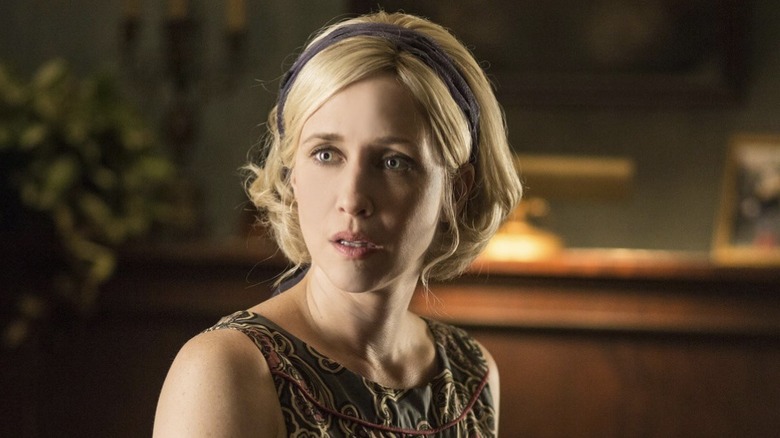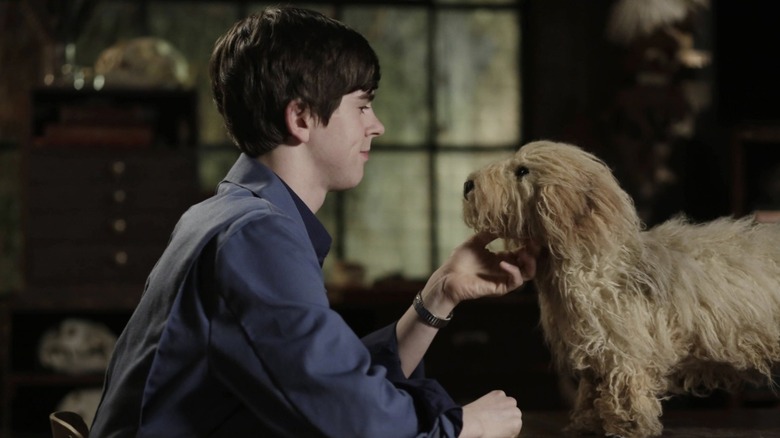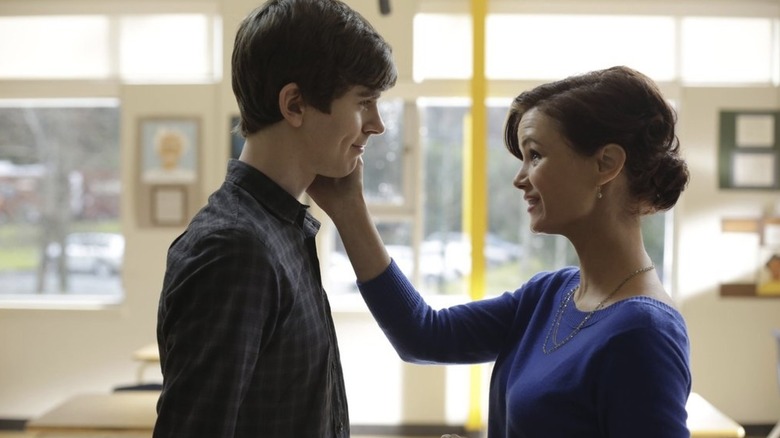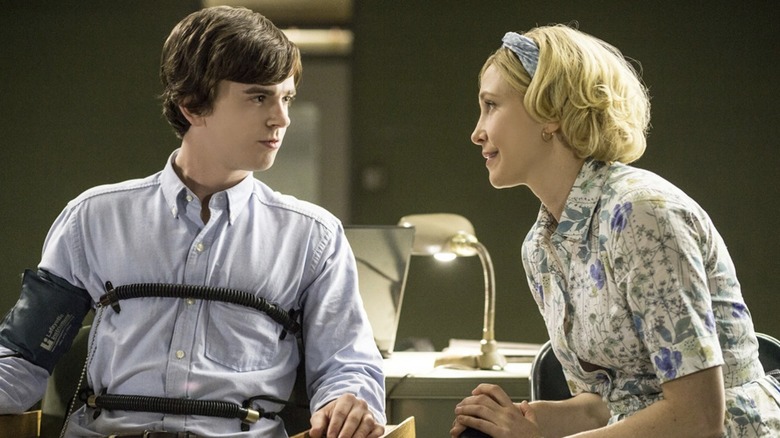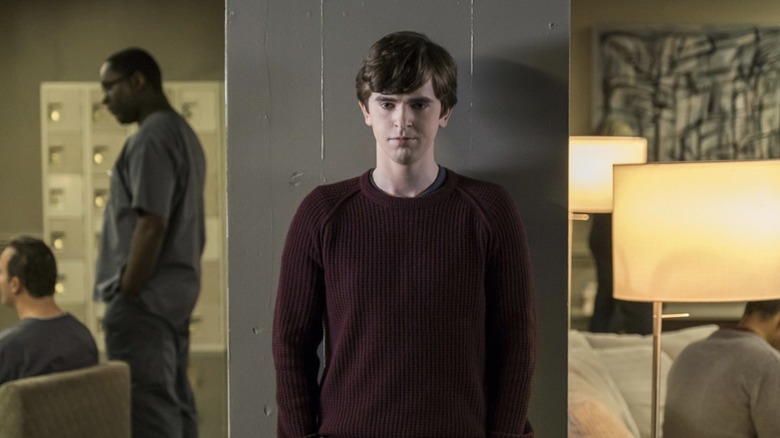The Dark History Of Norman Bates
Norman Bates' name was immortalized in 1960 when Anthony Perkins' unsettling performance as a soft-spoken serial killer in Alfred Hitchcock's "Psycho" terrified and thrilled audiences. The film garnered four Oscar nominations and is often credited as the first movie in the slasher genre, even if Hitchcock wouldn't classify it as such. In 1992, "Psycho" was added to the National Film Registry for preservation and is often lauded as Hitchcock's best-known film.
"Psycho" sparked the public's fascination with the macabre and the psychology of killers, ushering in a new wave of horror movies. In 1998, Gus Van Sant made a shot-for-shot color remake of "Psycho" starring Vince Vaughn as Norman and Anne Heche as Marion Crane. Carl H. Sederholm, an associate professor of literature at Brigham Young University, told the Christian Science Monitor, "Horror is often a terrific source for reflecting on American fears and anxieties. In my own teaching and writing, I like to point out that cultures may be studied through their monsters."
Norman Bates is one of our modern monsters and cultural touchstones. Our fascination with him sparked a film franchise, a remake, and a television series. Norman secured second place on AFI's 100 Greatest Heroes & Villains list, and he made the top 100 on Empire's 100 Greatest Movie Characters. Norman also secured fourth place on Premier Magazine's 100 Greatest Movie Characters of All Time, proving this character's longevity. Join us as we explore the dark history of Norman Bates.
Warning: spoilers ahead!
Norman Bates was loosely inspired by Ed Gein
Novelist Robert Bloch created Norman Bates for his 1959 novel "Psycho," which was adapted into the 1960 Alfred Hitchcock horror classic. In 1957 when Ed Gein was arrested for murder, Bloch lived in Wisconsin a measly 40 miles away. Gein became known as the Butcher of Plainfield. Bloch was intrigued by Gein's psychology and the idea a monster could live next door, hiding in plain sight in a small community (per NPR).
Bloch was already a well-regarded author when he published this novel. He was first published at 17 years old and was mentored by horror legend H. P. Lovecraft. Bloch's early work blended the supernatural with psychology. In an interview, Bloch said, "I realized, as a result of what went on during World War Two and of reading the more widely disseminated work in psychology, that the real horror is not in the shadows, but in that twisted little world inside our own skulls" (per Dark Echo).
Ed Gein was the perfect subject for a psychological thriller. Raised by an alcoholic father and a verbally abusive mother, Gein was suspected of killing his brother in 1944, although the death was ruled an accident. After his mother died in 1945, Gein created a shrine to her on the second floor of his house and slowly spiraled out of control. When local hardware store owner Bernice Worden went missing, Gein was the prime suspect. Police found her body at his home (per Britannica).
Norman Bates was a serial killer, but Ed Gein was not
When the police searched Ed Gein's home looking for Bernice Worden, they were not prepared for the horrors they would find inside. As Robert Bloch described in his article "The Shambles of Ed Gein," Worden's corpse was found in the shed. They also found her heart in a pan, on the pot-bellied stove, suggesting cannibalism.
When authorities searched the farmhouse, they found body parts from multiple victims. Gein used these parts to decorate his home, making furniture from human skin and carvings out of corpses. They also found clothing accessories made from human skin (per "The Shambles of Ed Gein"). Gein fascinated other writers; he was the inspiration for Leatherface in "Texas Chainsaw Massacre" and Buffalo Bill in "Silence of the Lambs" (per Britannica).
Gein admitted to murdering two women: Mary Hogan, who disappeared in 1954, and Worden, although he was suspected of killing more. Gein was convicted of one murder, but because of his insanity, Gein was hospitalized rather than sentenced to time in prison (per Britannica). The body parts found in Gein's house were from robbing the graves of local women. Gein is often referred to as a serial killer, but technically, you must murder three or more victims on separate occasions to qualify as a serial killer.
Actor Anthony Perkins was born to play Norman Bates
Norman Bates is described differently in Robert Bloch's novel than how he appears in Alfred Hitchcock's "Psycho." As reported by NPR, scriptwriter Joseph Stefano didn't like the depiction of Norman Bates in the novel. He thought Norman needed to be attractive and elicit sympathy to avoid suspicion from the audience. Hitchcock felt similarly, intending to cast Anthony Perkins, which was an actor that Stephen Rebello, author of "Alfred Hitchcock and the Making of Psycho," called "good-looking, elfin, strange."
As NPR reported, biographer Ronald Bergan wrote in "Anthony Perkins: A Haunted Life" about how Perkins shared childhood experiences with Norman, saying, "It's a weird coincidence that Joseph Stefano, the screenwriter, knew nothing about Tony Perkins' life, and yet he wrote that Norman Bates had lost his father at 5, had a very domineering mother, and that's exactly what happened to Tony." Perkins, like Norman, was also trying to keep facets of his personal life secret. While Norman was a killer, Perkins was simply a gay man living in the 1950s.
Reportedly, Perkins was involved in creating Norman's image for the screen. He helped pick his clothing and suggested Norman stammer and snack on candy corn when nervous. Perkins began his acting career as a heartthrob, but he was best known for playing Norman in many "Psycho" franchise films, as well as bringing the character to a bizarrely funny Oatmeal Raisin Crisp commercial. Perkins died at 60 in 1992 from AIDS-related complications (per NY Times).
Norman's origins are explored in the Bates Motel prequel series
The A&E television series "Bates Motel" is a modern prequel to the 1960 Alfred Hitchcock film, exploring Norman Bates' teen years and the development of his mental illness. Although the series takes inspiration from the film and novel, it also integrates some aspects of Ed Gein's life by giving Norman (Freddie Highmore) an older brother who has a contentious relationship with their mother, creating tension between the brothers.
"Bates Motel" follows Norman and his mother Norma (Vera Farmiga) from Arizona to Oregon for a fresh start, six months after his father's death. The modern series is set in a coastal town inspired by "Twin Peaks." The show explores Norman and Norma's strangely close relationship and generational trauma in the development of one of cinema's most famous serial killers.
They fix up the motel Norma bought before running into trouble with the former owner, Keith Summers (W. Earl Brown), who is angry about losing his property to foreclosure. When Norman walks in on Keith raping Norma, Norman knocks Keith out but goes into a trance after witnessing Norma kill Keith in an outburst of rage. This is our first suggestion there might be something off, not only with Norman but also with Norma, who insists on covering up Keith's murder to protect their financial investment, saying "Who is going to book a room in the rape-slash-murder hotel?"
If you or anyone you know has been a victim of sexual assault, help is available. Visit the Rape, Abuse & Incest National Network website or contact RAINN's National Helpline at 1-800-656-HOPE (4673).
Norman Bates had dissociative identity disorder
In the film "Psycho," we learn from a psychologist that Norman has multiple personalities, and his "Mother" personality was created by the trauma of killing his mother and her boyfriend. In "Bates Motel," Norman's dissociative episodes began earlier in life, when he was a teenager, and were preceded by entirely different traumas.
In Alfred Hitchcock's film and Robert Bloch's novel, Norman's father died when Norman was just a child, and he was emotionally damaged by his demanding, controlling, and religiously obsessive mother. Ed Gein's life inspired these experiences, as relayed in "The Shambles of Ed Gein." In "Bates Motel," Norman's father abused Norman and Norma, which traumatized Norman at a young age.
According to the National Alliance on Mental Illness (NAMI), dissociative disorders are "an involuntary escape from reality characterized by a disconnection between thoughts, identity, consciousness, and memory." Most people experience a dissociative episode in their lifetime, but only 2% of the population experience multiple episodes and are diagnosed with Dissociative Identity Disorder (DID). DID is precipitated by traumatic experiences and worsened by trauma.
As reported by Reel Run Down, Norman Bates from "Psycho" and "Bates Motel" exhibits symptoms of DID, formerly known as Multiple Personality Disorder. Norman experiences amnesia when an alternate personality takes over. We see Norman's blackouts develop into the Mother persona in "Bates Motel."
If you or someone you know is struggling with mental health, please contact the Crisis Text Line by texting HOME to 741741, call the National Alliance on Mental Illness helpline at 1-800-950-NAMI (6264), or visit the National Institute of Mental Health website.
Norma may have suffered from a mental illness as well
"Bates Motel" explores Norman Bates' teen years and the development of his mental disorder, but his mother Norma is a fascinating and troubling character, too. Like most parents, she plays a part in his mental and emotional development. If there was ever a perfect exploration of the saying "hurt people, hurt people," it is A&E's "Bates Motel." The series shows the effect generational trauma can have on mental health and the development of mental illness.
Some suggest Norma suffers from a mix of Borderline Personality Disorder (BPD) and Narcissistic Personality Disorder (NPD). Her erratic behavior and emotional outbursts throughout the series are a persuasive argument for these diagnoses. According to the National Institute of Mental Health, BPD "severely impacts a person's ability to regulate their emotions," leading to mood swings, impulsivity, and unstable relationships. People with BPD often experience childhood trauma. According to the Mayo Clinic, people with NPD "have an inflated sense of their own importance, a deep need for excessive attention and admiration, troubled relationships, and a lack of empathy for others."
Others suggest Norma exhibits symptoms of Factitious Disorder Imposed on Another (FDIA), which is a form of child abuse where a caretaker acts like their dependent has an illness when they actually don't. Norman's mental illness is very real, so this diagnosis for Norma isn't as persuasive.
If you or someone you know is struggling with mental health, please contact the Crisis Text Line by texting HOME to 741741, call the National Alliance on Mental Illness helpline at 1-800-950-NAMI (6264), or visit the National Institute of Mental Health website.
Norman killed his father
In the film "Psycho," Norman's father died when he was only 5 years old, and Norman's controlling mother abused him. But in "Bates Motel," we learn Norman began having his blackouts at a much younger age and killed his father during one of these blackouts to protect Norma from being abused by his father. Although Norma is manipulative, controlling, and over-involved, she is depicted as a sympathetic character with her own dark history.
In Season 1 of "Bates Motel," Norma confides in Dylan that Norman killed his father, hoping Dylan will help her protect Norman. Norman doesn't learn that he killed his father until Season 2 when he finally tells Norma explicitly about his blackouts. Knowing that she had been keeping a secret from him drives a wedge between Norman and Norma. In Season 3, Norman tries to individuate from Norma, adding a new element of tension to their relationship that wasn't present before.
If you or someone you know may be the victim of child abuse, please contact the Childhelp National Child Abuse Hotline at 1-800-4-A-Child (1-800-422-4453) or contact their live chat services.
If you or someone you know is dealing with domestic abuse, you can call the National Domestic Violence Hotline at 1−800−799−7233. You can also find more information, resources, and support at their website.
Norman's obsession with death is explored through his taxidermy hobby
Norman's taxidermy birds are prominent in Alfred Hitchcock's "Psycho," but Season 2 of A&E's "Bates Motel" explores Norman's interest in death through his obsession with Miss Watson's murder, and then through the development of this hobby. Norman's interest in taxidermy starts when he meets Emma's (Olivia Cooke) dad, Will Decody (Andrew Howard), who offers to teach him taxidermy. After a car hits the stray dog Norman was trying to befriend, Norman takes the dog to Mr. Decody.
Norma is against Norman taking up this hobby, thinking it is morbid and weird and will make it more difficult for Norman to fit in. It's obvious by this point in the series that Norma is more concerned about Norman blending in to avoid suspicion than wanting him to make friends. Despite her protestations, Norman outfits the basement of their home with a workshop and works on larger animals in Season 3.
Norma's concerns about this hobby aren't without merit. It's common knowledge torturing and mutilating animals is an early warning sign of serial killers in childhood. Norman isn't torturing animals, but he has chosen a hobby that gives him anatomy lessons without actually harming animals. Of course, this could simply be because Norman isn't a psychopath. As Matt Sonaik with The Week said, "Norman Bates was too delusional and disconnected from reality to qualify as being a psychopath," adding that he "was more psychotic than psychopathic."
Norman killed his favorite teacher
In the last episode of Season 1, Miss Watson finds Norman walking in the rain after the school dance and brings him to her house to clean the wound on his face. Miss Watson excuses herself to change before driving him home but leaves her bedroom door open so Norman can watch her undress. Norman is uncomfortable, feeling both aroused and repelled by Miss Watson's behavior and he experiences a blackout, coming back to himself while running down the street toward his home.
Although we don't see Norman kill Miss Watson at the end of Season 1, the implication of his guilt is clear. In Season 2, the story builds to the revelation Norman slept with and killed Miss Watson. When Norman killed his father, it was to protect his mother from a physical attack. When Norman kills Miss Watson, this is the first time we understand there is a sexual component to his killing, squarely defining him as a serial killer in the making.
Another sign Norman is becoming a serial killer is he keeps souvenirs or trophies. This began when Norman kept Keith Summer's belt in Season 1 of "Bates Motel" and continues when Norman has Miss Watson's pearls in Season 2. Despite not remembering killing her, Norman suspects he did, and Sheriff Romero suspects this too. During a lie detector test, Norman hallucinates Mother telling him she killed Miss Watson, helping him pass the lie detector test.
Norman and Norma's relationship may have been incestuous
In Robert Bloch's novel "Psycho," it is hinted Norman may have been sexually abused by his mother, who is extremely religious and impresses upon her son the idea that all women are "wh***s." In his essay "The Shambles of Ed Gein," Bloch states that the relationship in his novel between Norma and Norman is Oedipal. This idea is toyed with brilliantly in "Bates Motel." While the series never explicitly confirms incest between Norma and Norman, both characters exhibit jealousy over each other's romantic partners, and they have an undercurrent of sexual tension that is both palpable and incredibly uncomfortable to watch. In the last episode of Season 2, Norma and Norman share a kiss in the woods when Norma is trying to stop Norman from committing suicide after discovering he killed Miss Watson.
In Season 3, they even sleep in the same bed and spoon. It is never explicitly suggested there is something more going on off-camera, but their weird dynamic certainly leaves you wondering. Freddie Highmore told the Daily Beast, "When the show is pushed slightly too far, the audience is left to wonder if their relationship is normal or not," and as we get deeper into the seasons, it is obvious their bond is not normal, nor healthy. Although Norma fostered this strange bond, in Seasons 3 and 4 she becomes increasingly worried for both her and Norman's safety as he becomes increasingly detached from reality.
If you or anyone you know is having suicidal thoughts, please call the National Suicide Prevention Lifeline at 1-800-273-TALK (8255).
Norma had an incestuous relationship with her brother Caleb
When Norma confides to Norman in the last episode of Season 1 of "Bates Motel" that her older brother Caleb (Kenny Johnson) raped her when they were children, it sends Norman into an emotional spiral. He goes to the school dance with Emma but is distracted and agitated. Norman keeps this secret, but in Season 2 when Caleb arrives in White Pine Bay hoping to reconcile with Norma, we learn Norma's eldest son, Dylan (Max Thieriot), is actually Caleb's son.
Dylan is devastated by this revelation. When he confronts Caleb about raping Norma and being his father, Caleb denies it, saying Norma had a boyfriend who got her pregnant in high school. Caleb insists he didn't rape Norma, suggesting they had an inappropriate, but consensual relationship, finding comfort in each other from the constant abuse their parents doled out to each other and their children. Dylan takes the way Norma treats him as confirmation he is Caleb's son, but he doubts Norma's version of the story.
In Season 2 of "Bates Motel," the drama with Caleb exacerbates Norman's mental illness. We finally see Norman's Mother personality surface when Mother confronts Caleb in his hotel room about raping her when she was a teenager. While in his Mother persona, Norman thinks he has memories of the assault, demonstrating how detached from reality Norman is when he is having a dissociative episode.
If you or anyone you know has been a victim of sexual assault, help is available. Visit the Rape, Abuse & Incest National Network website or contact RAINN's National Helpline at 1-800-656-HOPE (4673).
Mother overtook Norman long before he killed Norma
In Alfred Hitchcock's "Psycho," Norman Bates is a self-described momma's boy who says things like "A boy's best friend is his mother." His personality split when he committed matricide, killing his mother and her boyfriend. In "Bates Motel," Norman begins experiencing blackouts as a teenager. In Season 2, it becomes clear these blackouts are linked to the appearance of Mother, Norman's murderous, alternate personality.
We first see the rise of Mother in Season 2 when Caleb comes to town to visit Norma, and later when she tells Norman that she killed Miss Watson and he is innocent. Mother becomes a regular in Season 3. He talks to her, speculating if he killed Annika Johnson, the sex worker who went missing while staying at the motel. Dylan also catches Norman dressed in Norma's robe, cooking breakfast for her sons in the middle of the night. After interacting with Mother, Dylan realizes Norman believes he is Norma and something is very wrong.
Season 3 culminates with Norman learning Norma intends to put him in a mental institution, and he decides to run away with Bradley Martin. Of course, Mother can't let Norman leave, so she takes over his body to kill Bradley in the season finale. She doesn't just take over. We see Mother, played by Vera Farmiga, actually appear on screen, replacing Norman during the murder scene. Season 3 is when Norman's psychosis escalates and he begins confusing fantasy with reality.
Norman spent time in a mental institution before he killed Norma
In Alfred Hitchcock's "Psycho," Norman Bates spends time in a mental institution briefly after his mother's death because the shock of finding his mother and her boyfriend dead caused a nervous breakdown. This experience explains why Norman has such a powerful reaction to Marion Crane, suggesting Norman "put his mother somewhere." After Norman is apprehended by the police in "Psycho" and Mother has supplanted Norman, there is no doubt Norman will be confined to an institution.
In Season 4 of "Bates Motel," Norma sends Norman to a mental institution. She pays for the institution by marrying Sheriff Romero so she can use his insurance. What starts as an arrangement becomes real, and Norma's relationship with Romero is too much for Mother. Season 4 culminates with Mother attempting to kill Norma and Norman so they can be together in the afterlife where no one else can interfere with their relationship.
Norman survives carbon monoxide poisoning, but Norma does not. Her death sets the scene for the events from the film "Psycho" to play out during the fifth and final season of the series. Although "Bates Motel" diverged from the novel and the film, it explored Norman Bates' dark history and proved Norma was always destined to die at the hands of the son she loved just a little bit too much.
